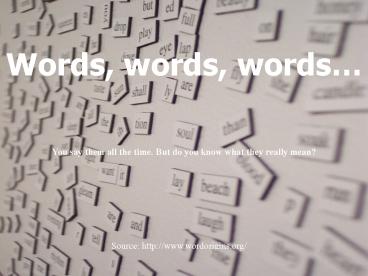Words, words, words - PowerPoint PPT Presentation
Title:
Words, words, words
Description:
I do not know whether not Vikings were among the first to practice rhinoplasty, but it is most definitely not the origin of the phrase, ... – PowerPoint PPT presentation
Number of Views:29
Avg rating:3.0/5.0
Title: Words, words, words
1
Words, words, words
You say them all the time. But do you know what
they really mean?
Source http//www.wordorigins.org/
2
Paparazzi Paparazzi, plural of Paparazzo, comes
from the name of a character in Fellini's La
Dolce Vita. In the movie, Paparazzo was a
photographer who would go to great lengths to
take pictures of American movie stars.
3
Pay Through The Nose Popular folklore has it
that this phrase dates back to 9th century
Ireland. Viking raiders would demand tribute from
the local Irish and slit open the noses of anyone
who refused to pay. I do not know whether not
Vikings were among the first to practice
rhinoplasty, but it is most definitely not the
origin of the phrase, which doesn't make its
appearance until 1672. Eight hundred years of an
underground existence is just too long to be
plausible. There is another 17th century slang
term for money, rhino. In Greek, of course, rhino
means nose. It seems logical that these two are
connected, but what significance a nose has with
money is simply not known.
4
Weapon of Mass Destruction This term for a
nuclear, biological, or chemical weapon is older
than you might think. It actually dates to 1937,
before the existence of nuclear or biological
weapons. It was first used by the London Times on
28 December of that year, "Who can think without
horror of what another widespread war would mean,
waged as it would be with all the new weapons of
mass destruction?" The original reference is to
aerial bombing of cities, which had become a
reality that year in the Spanish Civil War,
chemicals, and other modern weaponry. In the
1960s, the term weapons of mass destruction
became a jargon term of the arms control
community. Throughout the rest of the 20th
century, the term pretty much remained an arms
control jargon term, until 2002 when events in
Iraq brought the term into the public eye.
5
Wag the Dog The phrase "the tail that wags the
dog" dates to the turn of the century. In 1907,
it appeared in Von Arnum's Fraulein Schmidt. F.
Scott Fitzgerald used it in 1935. The meaning is
quite obvious, the subsidiary part is controlling
the major part. In its most current usage, the
case is of the media creating the crisis instead
of the crisis generating media interest.
6
Taliban The word Taliban is from the
Farsi/Pushtu Talib, meaning student (the root is
a borrowing from Arabic). The Taliban were
originally Afghan students in Islamic religious
schools, or madrassas, in Pakistan. In 1993, they
formed into a militant political group and
returned to Afghanistan, bringing their own
particular version of conservative Sunni Islam to
that country. By 1996, they had become the
dominant military and political force in the
country, capturing the capital, Kabul.
7
Redneck Redneck dates to 1830, when it was first
used to denote the Presbyterians of Fayetteville,
Georgia. But it wasn't until 1893 that the term
was used in the modern sense of a poor, white
farmer or laborer. The significance of the name
is somewhat obscure. Three explanations are
commonly offered. First, it could be a reference
to a ruddy neck caused by anger. Second, it could
be a reference to sunburned necks caused by
working in the fields all day. Finally, it could
be a reference to pellagra which turns the neck
red. The original reference to Presbyterians may
be to poor, Scotch-Irish farmers that was later
expanded to a larger economic class. There is
also a tale in which it referred to striking coal
miners who wore red bandannas as a means of group
identification. This is unlikely due to what we
know of its origin. The sunburn or pellagra
explanation seems more likely than the anger
one. Interestingly, the Afrikaans Rooinek, which
literally means redneck, is a disparaging term
the Boers used to apply to the British and later
became associated with any European immigrant to
South Africa.
8
Gossip This is a very old word with a much more
modern meaning. It comes from the Old English
godsibb, meaning a godparent or baptismal
sponsor. It comes from god sib (meaning blood
relation as in sibling). It dates to at least
1014. By 1362, the term was being used to mean a
close friend, one you might chose to be godparent
to your children. It was applied to both men and
women, although in later uses it came to be
applied only to women. By 1566, the word was
being used to mean a flighty woman, one who would
engage in idle talk. From there it came to mean
the idle talk itself.
9
Polka Dot Where did this name for round circles
of dye on clothing originate? And what, if
anything, does it have to do with the dance of
the same name? In the 1840s, the polka was
sweeping America. It was the latest dance craze,
like the Charleston of the 1920s or the Macarena
of a few summers ago. In an effort to cash in on
the fad, manufacturers began naming all sorts of
thing polka. Polka gauze, polka hats, polka
curtain bands and many other products with the
polka name hit the market in the 1840s. Although,
the actual term polka dot is not attested to
until the 1880s. Of these, only polka dots
survive today. There are two possible origins for
the word polka. It could come from the Czech
pulka, or half-step, Pul meaning half. Or, it
could be a combination of the polonaise and
mazurka.






























